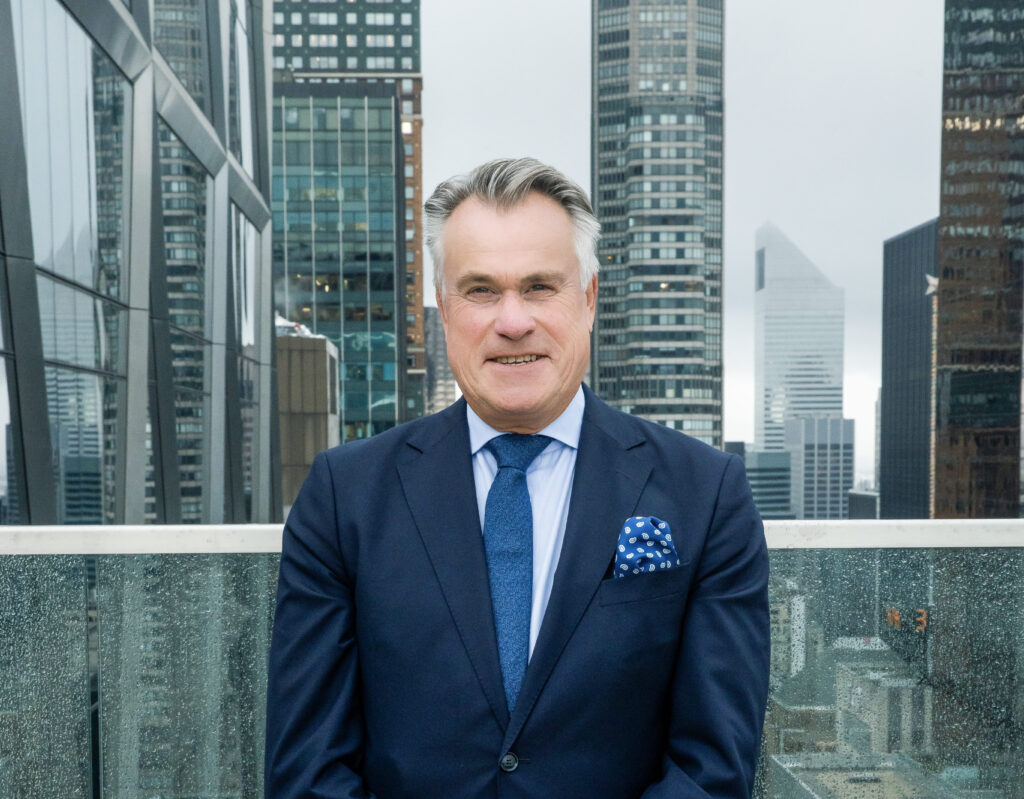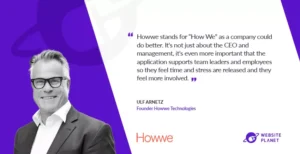In a world where innovation and entrepreneurship shape the future, there stands a man at the very forefront: Ulf Arnetz. With four startup companies sold at impressive valuations to Nasdaq-listed corporations in the USA, Ulf is one of Sweden’s most influential and successful entrepreneurs. His remarkable accomplishments include being named a “Leader of the Future” and featured in Deloitte’s Fast 500, which ranks the world’s 500 fastest-growing companies.
High above the ground, in a majestic skyscraper in the heart of New York City, we meet Ulf Arnetz. As the founder of the IOS group, which sold for over 500 million kronor after just six years, Corechange, sold for 200 million kronor, and now as the CEO of Howwe Technologies, Ulf shares insights and factors that have made him a master of rapid growth and success in business.
Ulf, you have been a key figure behind several business success stories. Can you tell us more about your work and how your view on leadership has influenced these companies?
– It has been an incredible journey so far, and I take pride in hatching great ideas that are on the right trend, which has been key to my career successes. I aim to build products for future trends. But what I am most proud of is being that leader in the beginning who actually gets everyone in the company on board. Leadership for me is much about achieving good results, it’s important to let go so others in the company can grow. There are two types of CEOs; one is for growth and the other is to take a helicopter perspective and let go of micromanaging in the organization. The leadership advice I wish I had earlier in my career is to delegate. Leadership is very much about how and when to delegate. Do it right, and everyone gets to fly.
IOS Group, which you founded, was sold for an impressive half billion kronor after just six years. What were the key factors that led to such rapid growth and success?
– Rapid growth requires a strong vision, a committed team, and the ability to adapt to changing market conditions. For IOS Group, it was about being agile and never stopping to think ahead. The factors for success were distinguishing between value and trend versus rapid growth. We grew “only” by 70% in the last 1,5 years before selling, but we were early and had just the right timing for a fast-coming trend and saw strong ROI from our major customers in Sweden. The valuation when we sold was 12x income, which was incredibly high at the time. After selling IOS Group to Cambridge Technology Partners, I took on the role of CEO for the European market and nearly tripled the turnover for the European market in two years.
You have founded companies that have been acquired by Nasdaq-listed companies, like IOS Group and Corechange. Can you share your experience of taking a company to the American market and the challenges and opportunities that it entailed?
– My approach has been to create and test a product in the Swedish market and then go directly to the American market. Sweden is an excellent test market, but the money and volume are in the US. The challenge in the US is meeting the high demands for transparency and reporting, but the opportunity for growth and attracting investors is significant. What can we in Scandinavia learn from the US? There’s a lot we can learn from American entrepreneurship. In American companies, it’s incredibly important to deliver results when a new leader comes in. There’s a goal, a turnover, or a result to be achieved. It’s the same in Sweden, but we focus too much on why things didn’t go as planned. You’re out in the newspapers talking about how you’ve really helped the company do well. And when it goes badly, you might blame the economy or something similar. That excuse doesn’t exist in the US. It’s the results that count. But there’s also a lot that Americans can learn from us Scandinavians. Scandinavia is ahead in terms of delegating. Trusting your organization and employees. In the USA, it’s common for senior managers to think they are doing a good job if they barely take a vacation, because if they take a vacation, the company goes under.
Your latest venture is Howwe Technologies, tell us more about what you do.
– My focus, and a big reason behind the success of my companies, is that we solve a major problem in the market. As CEO and entrepreneur, I have been able to predict shifts in the market and especially in behaviors among CEOs throughout my career, and that’s exactly how the growth solution Howwe was born. Howwe is a platform used by everyone in the company, but developed for the needs of the CEO; to make work and leadership more efficient. The end goal is freed up time, growth, and increased revenues.
But does a CEO need an application, doesn’t he/she have other things to do?
– Studies by Gartner and MIT show that we are moving towards a time where the CEO role needs to become more digital, and using a digital application to drive a strategy will become as common as for a salesperson to use a CRM tool.
And what does this mean in practical terms?
– The sales manager, marketing manager, HR manager, etc., all have a digital application that drives what they are measured on and helps them to lead their teams. Today, the CEO is the only one without a digital application. This is problematic because the CEO is measured directly against the company’s income and growth, but how can that be measured in real-time if you’re working in, for example, Excel? Howwe simplifies strategy implementation and gets every employee in the company on the journey towards increased growth. With Howwe, we deliver measurable results. Our customers see an ROI of 8-25x within 12 months. With Howwe, every employee becomes involved in the company’s key goals and the strategies that take the company to those goals, but most importantly – their individual activities and contributions are directly linked to the company’s key goals. It’s incredibly important to create engagement and involvement and get the employees on the journey.

As an entrepreneur and leader, you have emphasized the importance of creating a culture of proactivity and focus. How have you implemented and promoted this within your organizations?
– Proactivity and focus require clear communication, clear goals, and creating an environment where employees are encouraged to take their own initiatives. I have always encouraged openness and constant communication within the team.
In your career, you have written several books, including “Strategic-IT” and “Strategy Acceleration – faster, measurable, more fun”. Can you share some key insights or advice from these books and how they can be applied in the business world?
– My books emphasize the importance of having a clear strategy, measurable goals, and making the business strategy fun and engaging. It’s about getting the whole organization to understand and support the strategy.
Delegation is an important aspect of leadership and you have emphasized the importance of doing it right. Can you explain your view on delegation and share some advice on how to balance it correctly?
– Delegation is about giving responsibility while providing clear frameworks and expectations. Finding the right balance between allowing employees to take initiatives and maintaining control is key to success. Learning the art of delegation, the pieces that must be in place before you delegate, and when you absolutely should not delegate, is something I wish I had learned earlier, but I now make sure to share what I’ve learned through mistakes and success.
One of your success factors has been to prioritize correctly. Can you give examples of how you have handled priorities and decisions that have positively affected your companies?
– Prioritizing is about identifying the most strategic activities and focusing on them. I have had a clear strategy and goals that have guided decisions and priorities within the companies I have been involved in.
Achieving success in the business world can be challenging and often requires handling both successes and setbacks. Can you share some of the biggest challenges you have encountered in your career and how you have overcome them?
– Managing rapid growth and change can be a major challenge. I have always maintained open communication with the team and been prepared to adapt to new circumstances. Flexibility is key. One challenge I encountered was after I sold my first company, IOS Group. I was in Boston building Corechange, my second company, and started where I left off with IOS Group, i.e., not at a start-up level. When you build a start-up, it’s very much about the culture, and it’s often the culture that gets people on the journey. We had a nice office in the middle of Boston and paid high salaries. But the company didn’t take off as I had hoped and believed. It was only after we almost went under that I realized we had started at a far too high and unrealistic level. A start-up needs to be built from the ground up, convey a dream, and that’s also where we have the chance to set the culture that gets people on the journey and towards the dream.
As a mentor and board member, you have influenced other companies and entrepreneurs. What qualities and advice do you emphasize when you support and advise other business leaders?
– I emphasize the importance of having a strong vision and strategy, being proactive, and building strong teams. I also encourage learning and being open to change.
Finally, what do you see as the main opportunities and challenges for entrepreneurs aspiring to achieve the same level of success and global presence as you have?
– The main opportunities lie in being able to adapt to a rapidly changing world and using new technology to create innovation. The challenges include competition and maintaining focus on the most strategic goals. Success requires patience and persistence.
About Ulf Arnetz

Multiple Successful Start-ups
Ulf Arnetz has a remarkable ability to create and sell start-ups to Nasdaq-listed companies in the USA. His corporate footprint includes, among others, the IOS Group, which was sold for 500 million kronor after just six years, and Corechange, sold for over 200 million kronor.
Prestigious Awards
With an impressive spot on the Deloitte Fast 500 list as one of the world’s 500 fastest-growing companies (Corechange), being named Entrepreneur of the Year, and numerous technological innovations, Ulf Arnetz has proven to be one of the driving forces behind expansion and growth in the business world.
Authorship and Knowledge Sharing
Arnetz has authored several books on business strategy, including “Strategic-IT,” “The Tornado – a Positive Force in the Workplace,” and “Strategy Acceleration – Faster, Measurable, More Fun.” His books have been a source of inspiration for business leaders around the world.
Mentorship and Board Roles
In addition to his own business successes, Arnetz has engaged as a mentor and board member in several prominent companies like DICE, Springlife, and MSAB, further underscoring his broad influence in the industry.
Forward-Looking Vision
Arnetz is known for his in-depth insight into market trends and his ability to anticipate future business opportunities before they mature. His ability to be at the forefront of industry development has cemented his position as a leading innovator in the business world.
Engagement in Future Leaders and Entrepreneurs
Arnetz is keen on creating conditions for tomorrow’s technological innovations and giving young entrepreneurs behind the ideas a place to grow. Under his guidance, several successful companies have emerged in the incubator at Howwe Technologies, among them the weekly allowance app Gimi, which teaches children about saving and the value of money, and the golf app Golfers Sweden, which is Sweden’s leading golf booking app.
Interview by Doreen Månsson published in Affärsresenären (The Business Traveler).





